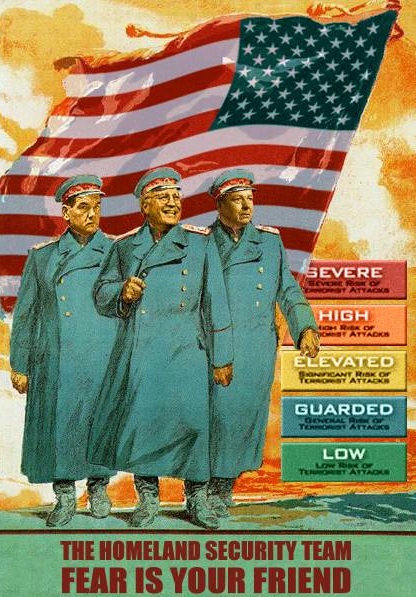EDITOR’S NOTE: HIGHLY RECOMMENDED
WASHINGTON POST: A Near-Meltdown
As the election season got underway in early 2004, a secret battle over the legality of warrantless domestic surveillance brought the Bush administration to the brink of a mass exodus from the Justice Department and FBI. A guide to who knew and did what about the surveillance program:
Dick Cheney
The vice president, conceived and supervised the domestic surveillance program. He kept President Bush out of the loop on the legal crisis until it was nearly too late.
David S. Addington
Counsel to Vice President Cheney, fought against any concession to the Justice Department’s legal concerns.
Alberto Gonzales
White House counsel, made highly misleading claims about the surveillance program to key members of Congress.
Andrew H. Card, Jr.
White House chief of staff, worked with Gonzales, Cheney and Addington to quash dissent at Justice — without informing Bush.
Joel Brenner
Inspector general of the National Security Agency, tried to keep his agency on the straight and narrow but had no access to key paperwork.
Vito Potenza
NSA acting general counsel, was barred from reviewing the surveillance program’s basic legal documents.
Michael V. Hayden
NSA director, feared legal liability for himself and his agency after the Justice Department ruled the domestic surveillance illegal.
Robert S. Mueller III
FBI director, stood with Comey against Addington and Cheney. “This is a rule-of-law question, and the answer is at Justice,” he told Bush.
John C. Yoo
A lawyer in the Justice Department’s Office of Legal counsel, crafted legal authority for warrantless domestic surveillance during the program’s first 18 months.
Jack L. Goldsmith
Chief of the Justice Department’s Office of Legal Counsel, ruled that the surveillance program was illegal and set the stage for a showdown with Bush.
James B. Comey
Deputy attorney general, took command at Justice when Attorney General John D. Ashcroft fell ill and subsequently told Bush that he had been misled.
John Ashcroft
Attorney general, certified the surveillance program and later regretted doing so.
Frances Fragos Townsend
Deputy national security adviser for combating terrorism, warned her boss about the brewing rebellion at Justice.
Condoleezza Rice
National security adviser, passed Townsend’s warning to Bush. Less than two hours later, Bush faced a painful dilemma.
George W. Bush
The president, discovered his peril at the very last moment and veered sharply away from Cheney’s course.


![[Photo of Dick Cheney]](http://media.washingtonpost.com/wp-srv/photo/politics/cheney/thumbs/Cheney-Dick.jpg)
![[Photo of David S. Addington]](http://media.washingtonpost.com/wp-srv/photo/politics/cheney/thumbs/Addington-David.jpg)
![[Photo of Alberto Gonzales]](http://media.washingtonpost.com/wp-srv/photo/politics/cheney/thumbs/GONZALES.jpg)
![[Photo of Andrew H. Card, Jr.]](http://media.washingtonpost.com/wp-dyn/content/photo/2006/03/15/PH2006031501096.jpg)
![[Photo of Joel Brenner]](http://www.washingtonpost.com/wp-srv/politics/interactives/cheney/images/nophoto_80x72.gif)
![[Photo of Michael V. Hayden]](http://www.washingtonpost.com/wp-dyn/content/photo/2008/07/04/PH2008070402858.jpg)
![[Photo of Robert S. Mueller III]](http://media.washingtonpost.com/wp-srv/photo/politics/cheney/thumbs/mueller.jpg)
![[Photo of John C. Yoo]](http://media.washingtonpost.com/wp-srv/photo/politics/cheney/thumbs/Yoo-John.jpg)
![[Photo of James B. Comey]](http://media.washingtonpost.com/wp-srv/photo/politics/cheney/thumbs/comey.jpg)
![[Photo of John Ashcroft]](http://media.washingtonpost.com/wp-srv/photo/politics/cheney/thumbs/Ashcroft-John.jpg)
![[Photo of Frances Fragos Townsend]](http://media.washingtonpost.com/wp-srv/photo/politics/cheney/thumbs/townsend.jpg)
![[Photo of Condoleezza Rice]](http://www.washingtonpost.com/wp-srv/nation/specials/war-within/dissension/rice.gif)
![[Photo of George W. Bush]](http://media.washingtonpost.com/wp-srv/photo/politics/cheney/thumbs/Bush-George.jpg)
